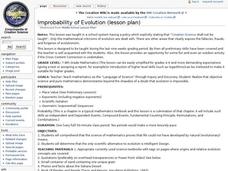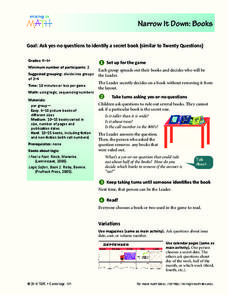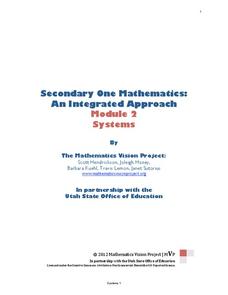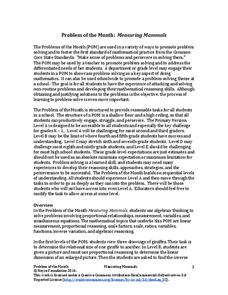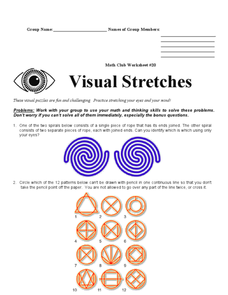Math Stars
Math Stars: a Problem-Solving Newsletter Grade 7
Put on your thinking caps because middle school math has never been more interesting in this huge resource full of thought provoking questions. Written as a newsletter, the resource has 10 two-page newsletters with a variety of...
Curated OER
Exam One Review
In this secondary mathematics activity, students solve problems that involve patterns, arithmetic and geometric sequences, geometric logic and reasoning, and changing bases. The three page activity contains fourteen problems. Answers...
Curated OER
Handshakin'
Students investigate the concept of solving problems when given it in words and employing a wide variety of methods. They practice applying a logical sequence to find the solution to a problem while estimating possible answers to help in...
Curated OER
Island Biogeography and Evolution
Students use this activity as a logic problem that is based on real organisms and real data. The problem is to develop phylogenies for seven related populations of lizards living on the Canary Islands. Three phylogenetic charts are...
Curated OER
Island Biogeography and Evolution: Solving a Phylogenetic Puzzle With Molecular Genetics
Young scholars engage in solving a logic problem based on real organisms and real data. They develop phylogenies for seven related populations of lizards living on the Canary Islands.
Curated OER
Is This a House for Hermit Crab?
First graders identify text that uses sequence or other logical order. They identify and interpret how different plants and animals inhabit different kinds of environments and have external features that help them thrive in different...
Curated OER
Patterns to the Rescue
Learners watch the Cyberchase episode, "The Poddleville Case" and play online games to examine how patterns are sequences that repeat or change in an orderly way. The lesson plan culminates with students creating their own patterns to...
Curated OER
Improbability of Evolution
Students disprove evolution. In this science activity, students disprove evolution by attempting to prove that creation is the way it all began. They use the improbability that evolution could exist and expose its fallacies, frauds and...
Curated OER
Translating Genetic Information
Students explore the process of translation. They determine the correct sequencing and present their strands to the class. In addition, they compare normal red blood cells to sickle cells and complete discussion questions.
Curated OER
Math and Music: Fibonacci Sequence
Students investigate the mathematical patterns of the Fibonacci Sequence. They determine how math is connected to music, specifically looking at music the uses the pattern sequence found in the Fibonacci Sequence.
Curated OER
Narrow It Down: Books
Students ask yes-no questions to identify a secret book. In this asking questions lesson, students ask yes or no questions about books to identify a secret book. Students identify the book and then read one of the example books.
Cold Spring Harbor Laboratory
The RNA Message Is Sometimes Edited
In 1993, Phillip Sharp and Richard Roberts won the Nobel Prize for their discovery of split gene theory. Learn about the breakthrough with the help of an online interactive. Hear both scientists explain it in their own words, watch an...
Curated OER
Solving a Simple Maze
It is a-maze-ing how lost one can get. Teams reconstruct a simple maze and solve it. Participants create an algorithm that a robot would follow in order to solve the maze as well. The activity includes an extension directing pupils to...
Mathematics Vision Project
Module 2: Systems of Equations and Inequalities
The brother-sister pair Carlos and Clarita need your class's help in developing their new pet sitting business. Through a variety of scenarios and concerns presented to the siblings, the learners thoroughly explore systems of equations...
Noyce Foundation
Measuring Mammals
Explore the meaning of scale and proportion with a set of five activities that examines the topic from elementary through high school. The first lessons explore ratio by examining pictures of different sizes. The next three activities...
Curated OER
A Visit to the Rain Forest
First graders preview "The Great Kapok Tree" by discussing the cover and the tree. They read the book and acknowledge the animals. They play a sequencing game in groups to identify the order the animals appeared in the book.
Curated OER
Character Education-Honesty
First graders learn the importance of honesty as they practice problem solving, listening, and sequencing skills. The lesson uses the story, " Too Many Tamales."
Curated OER
Biochemical Cycles: Recycling Carbon and Nitrogen
Students construct flow diagrams of the carbon and nitrogen cycle processes. They identify sequences in each cycle that are affected by human impact and present their research to the class.
Pennsylvania Department of Education
Tell Me Again
Students demonstrate how to retell a story in sequential order. In this reading comprehension instructional activity, students listen to a suggested read aloud, such as Little Boy Blue. Additionally, students practice retelling the story...
Curated OER
Triangle Sums
Fourth graders determine a way to place numbers in the nine circles that are arranged in a triangular pattern so that each side has an equal sum. They use each number once and practice adding single digit numbers.
Curated OER
Things Happen in Order
In this order of events instructional activity, students read an example of order of events, then write pairs of words in their logical order. One example is completed for students
Curated OER
Math Club Worksheet #30 - Visual Stretches
In this visual math puzzle worksheet, students work in groups to find the answer to 6 math puzzles. They work with geometric shapes and symbols.
Curated OER
Humpty Dumpty: The Whole Story
Fifth graders analyze a nursery rhyme to explore the writing process. In this writing process lesson, 5th graders recite Humpty Dumpty and chart the plot of the story. Students select their own nursery rhyme and write a creative story...
Curated OER
Making Predictions
Seventh graders read stories, stopping periodically to make predictions. They discuss how the sequence of events, as well as cause and effect, can give hints to the outcome of the story. In addition, 7th graders use logic and...
Other popular searches
- Logical Sequence of Events
- Logical Sequence in Sentences
- Logical Sequence Ordering
- Logical Sequence Lessons
- Logical Sequence Lesson 2
- Ideas, Logical Sequence
- Logical Sequence Lesson 3
- Ideas Logical Sequence
- Logical Sequence Make Tea









